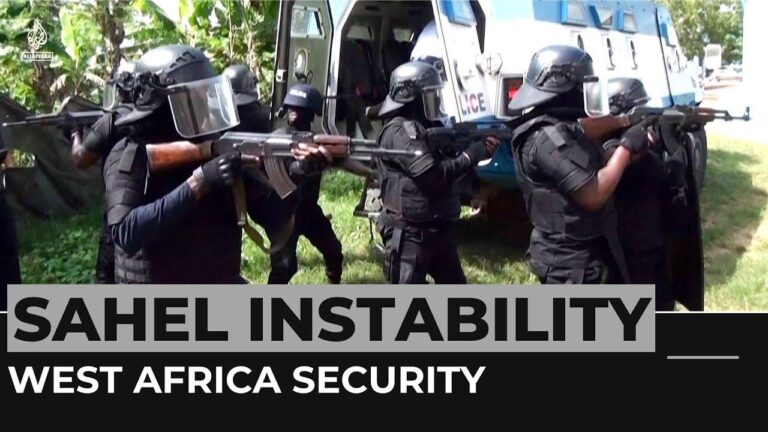In a significant shift in international relations, a senior official has stated that the security challenges plaguing West Africa are no longer solely the responsibility of France. This declaration comes amidst rising concerns over instability in the Sahel region, where militant groups have flourished and violent extremism has escalated. The announcement marks a pivotal moment in France’s historical involvement in West African security matters, particularly following a series of coups and escalating tensions that have redefined the geopolitical landscape. As local governments grapple with these persistent threats, the implications of this change resonate deeply across the region and beyond. This article delves into the evolving dynamics of security in West Africa and the repercussions of FranceŌĆÖs withdrawal from its longstanding role.
West Africa’s Evolving Security Landscape and Its Implications for Regional Stability
In a significant statement, West Africa’s leadership is shifting the narrative surrounding security dynamics in the region. Recent discussions among key ministers indicate a growing sentiment that the responsibility for stabilizing the region should increasingly fall on local governments rather than external powers, particularly France. This evolving perspective highlights the urgency for West African nations to strengthen their military capabilities and enhance regional cooperation. The minister’s comments reflect a broader trend of decolonization of security efforts, emphasizing self-reliance and local engagement in combatting terrorism, piracy, and transnational crime.
The implications of this shift are profound, as regional forces are urged to take a more active role in peacekeeping and crisis management. The formation of collaborative military frameworks, such as the Economic Community of West African States (ECOWAS) Standby Force, stands as a testament to this commitment. Key areas of focus include:
- Enhanced Training Programs for local military and police forces.
- Joint Operations between neighboring countries for increased effectiveness.
- Community Engagement initiatives to build trust and intelligence at the grassroots level.
| Security Challenges | Regional Response |
|---|---|
| Terrorism | Joint counterinsurgency operations |
| Piracy | Naval patrols in the Gulf of Guinea |
| Transnational Crime | Cross-border intelligence sharing |
The Waning Influence of France: Analyzing the Shift in Security Partnerships
In a recent statement, a senior government official underscored a significant shift in the dynamics of security in West Africa, marking a departure from France’s long-standing role as a primary stabilizing force in the region. The minister emphasized that local governments are now expected to take the lead in addressing their security challenges, citing a growing sense of national sovereignty and the need for a tailored approach to counter-terrorism efforts. This repositioning reflects broader shifts in geopolitical alliances and the diminishing influence of traditional powers in a region facing escalating violence and instability.
Factors contributing to this gradual decline of French influence include:
- Increased anti-French sentiment among local populations.
- The rise of new strategic partnerships with global powers such as the United States and Russia.
- An evolving landscape of regional organizations, such as ECOWAS, taking a more proactive role in security.
While an array of complex security issues persists in West Africa, the decisive pivot away from foreign intervention signals a confidence among local leaders to forge solutions that resonate with their communities. As they navigate these turbulent waters, the reshaping of alliances will likely have profound implications for both regional stability and international diplomatic relations.
Local Forces Rising: Strengthening Regional Military Capabilities for Sustainable Peace
In a significant shift in the security landscape, West African countries are increasingly taking the reins in addressing their regional conflicts and security challenges. The French minister’s recent remarks underscore a growing sentiment among local governments that they must assume primary responsibility for their own security, moving away from reliance on external powers. The emphasis is on bolstering local forces through enhanced training, strategic partnerships, and investments in military infrastructure. This transformation aims to establish a self-sustaining defense framework that prioritizes the resilience of national and regional armies.
Key elements of this operational shift include:
- Capacity Building: Training local military forces in modern warfare and counterterrorism strategies.
- Intelligence Sharing: Fostering collaboration between neighboring nations to enhance situational awareness.
- Resource Allocation: Increasing budgetary allocations for defense to support the establishment of robust military capabilities.
- Community Engagement: Involving local populations in security initiatives to help reduce extremism and build trust.
To provide a clearer picture of the regional military investment, the following table presents emerging military budgets among key West African nations:
| Country | Military Budget (USD) | Year-on-Year Change (%) |
|---|---|---|
| Nigeria | 2.5 Billion | 5% |
| Mali | 700 Million | 10% |
| Ivory Coast | 1 Billion | 8% |
| Ghana | 600 Million | 7% |
International Cooperation: Recommendations for Engaging Global Stakeholders in West African Security
The evolving dynamics of West African security require a renewed focus on multilateral engagement among various global stakeholders. Strategic partnerships can bolster local capacity-building initiatives, essential for addressing the complex roots of instability. To enhance cooperation, it is crucial to:
- Foster dialogue between regional organizations and international powers to align security priorities.
- Invest in training programs for local forces, aiming to enhance operational effectiveness.
- Encourage knowledge-sharing through conferences and workshops focused on mitigating security threats.
Moreover, establishing frameworks for adaptive responses to emerging threats will enable stakeholders to react swiftly to crises. Such frameworks should include mechanisms for intelligence sharing, logistical support, and humanitarian assistance, ensuring a holistic approach to security. In this context, a collaborative effort among nations can lead to more resilient communities. Key recommendations include:
- Implementing joint exercises to improve interoperability among forces.
- Creating an integrated response team for expedited crisis management.
- Developing a regional security database for better monitoring and response coordination.
Closing Remarks
In conclusion, the shifting dynamics of security in West Africa mark a significant pivot away from FranceŌĆÖs longstanding military involvement in the region. As nations like Niger, Mali, and Burkina Faso increasingly assert their sovereignty and seek alternative security partnerships, the implications for regional stability and international relations are profound. The statement from the French minister underscores a broader trend of re-evaluating foreign military roles amid rising anti-French sentiment and evolving geopolitical landscapes. As West African nations navigate their security challenges, the future of France’s influence in the area remains uncertain, raising questions about the effectiveness of existing alliances and the potential for new alliances to emerge in an increasingly complex environment. The necessity for a comprehensive, locally driven solution in West Africa has never been more pertinent.




